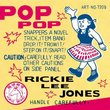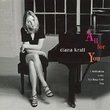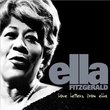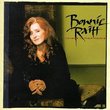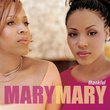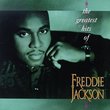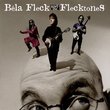| All Artists: Darcy James Argue Title: Infernal Machines Members Wishing: 1 Total Copies: 0 Label: New Amsterdam Original Release Date: 1/1/2009 Re-Release Date: 10/27/2009 Genres: Jazz, Classical Styles: Swing Jazz, Historical Periods, Classical (c.1770-1830) Number of Discs: 1 SwapaCD Credits: 1 UPC: 616892006862 |
Search - Darcy James Argue :: Infernal Machines
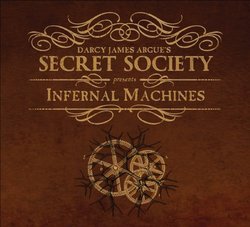 | Darcy James Argue Infernal Machines Genres: Jazz, Classical
|
Larger Image |
CD DetailsSimilarly Requested CDs
|
CD ReviewsChillingly gorgeous and fantastically retro futuristic Jamimicah | Madison, WI | 05/18/2009 (5 out of 5 stars) "i am less adept at this then i would wish, so i am going to quote Newsweek. suffice it to say, this is a hauntingly gorgeous, beautifully and masterly spun web of sound. A+! *******"For a wholly original take on big band's past, present and future, look to Darcy James Argue, a 33-year-old Brooklynite who has composed a batch of manifestoes that draws on past legacies, and adds a little postpunk energy to boot. A onetime student of big-band visionary Bob Brookmeyer, Argue himself seems a natural product of an era in which genres can be shuffled with ease on iPod playlists. Talking with him, you go from discussing obscure Italian serialist composers to indie bands like TV on the Radio. The composer calls his music "steampunk big band," a reference to the niche art movement that fantasizes about modern tech innovations existing in the steam-powered era. That range is reflected--and, more important, is made frictionless--on Argue's debut record, "Infernal Machines." Argue's tunes can command your attention anywhere--no small feat in our media-saturated world. He and his 18-piece Secret Society band pull off the trick by pairing electro-influenced rhythms with fuzzed-out guitars, fearsome horns and chamber-music voicings in the woodwinds. For all this panstylistic erudition, though, Argue's music still swings hard whenever it wants. "Transit" explodes with an elaborate fire that recalls Mingus's "Let My Children Hear Music." The song "Jacobin Club," named after Robespierre's merry band, slinks with the sly wit of "Such Sweet Thunder"-era Ellington, proving Argue is no enemy of history. Listen on headphones, and you can hear a lot of rocklike production layering. Two thirds through "Habeas Corpus (for Maher Arar)"-- a civil-rights ode that's timely in light of the Obama administration's release of Bush-era "torture memos"--the production supports its trombones, stabbing like sirens, with a guitar that chugs ominously low in the mix. Argue is one of a handful of musical free-thinkers who have found a home on New Amsterdam Records, an upstart label that has been releasing one quality disc after another since its founding. Built around old traditions (mostly classical, and now jazz), each New Amsterdam record also reaches out to the beat-focused worlds of other contemporary music. This is not a condescension to the market, but a reflection of the artists' own desire to knock down genre boundaries. These are albums, says Judd Greenstein, one of the label's cofounders, specifically produced to sound good on an MP3 player during your commute. Just as Argue brings non-jazz elements to bear in his music, "Now," from Greenstein's NOW Ensemble, imports a catchy inflection to classical forms. One Greenstein composition on that release is titled "Sing Along"--a command that doesn't apply all that frequently to contemporary chamber music. On the whole, New Amsterdam is making a nice little tradition out of breaking tradition. The real question is whether its music will find its way into the hands of hungry young performers in ensembles outside the metropolises. Perhaps local high-school music directors should strike a deal with their charges. Yes, you still have to wear the big-band uniforms or those god-awful tuxes, but with those outfits comes a copy of "Infernal Machines" or "Now." Striking a balance between the old and the new has rarely sounded this good"." Modern big band music Anthony Cooper | Louisville, KY United States | 08/06/2009 (4 out of 5 stars) "Darcy James Argue takes big band music in new directions with "Infernal Machines". The opening "Phobos" has a rock-based rhythm and, along with the next three songs, is very modern-sounding. The writing is such that I don't particular notice the solos -- everything is organic. The ensemble playing is also very tight. Each song thus depends on the writing. After a very good start, the second half is unfortunately not as good, though I still enjoy "Habeas Corpus" and "Obsidian Flow". This disc is pretty good, and Darcy James Argue certainly makes us see he's a talent with more good stuff to come. " Big Band Jazz at Its Finest namae | 06/03/2009 (5 out of 5 stars) "Expanding the work of forebears Bob Brookmeyer, Maria Schneider and John Hollenbeck, Darcy James Argue has put together a program of works for the big band that go beyond Jazz. In pieces such as Habeas Corpus, we find the influence of Steve Reich along side rock beats as well as the solo-oriented improvisation associated with Jazz. More than just a grab bag of genres, however, Darcy's music has found a voice of its own. Do yourself a favor and buy this recording, it is just a taste of what is to come from this rising star."
|

 Track Listings (7) - Disc #1
Track Listings (7) - Disc #1
